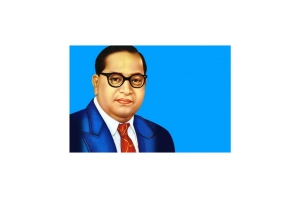On 15th August, 1947, on the eve of India’s Independence, at the stroke of midnight hour, when the world was sleeping Pt. Jawahar Lal Nehru while addressing the Indian Constituent Assembly said “That future is not one of ease or resting but of incessant striving so that we may fulfil the pledges we have so often taken and the one we shall take today. The service of India means the service of the millions who suffer. It means the ending of poverty and ignorance and disease and inequality of opportunity”.
The ambition of Indian people echoed from the Central Hall of the Parliament house could have been realized only by a dynamic and visionary path of development. Such path could have been given through a constitution and for that on 29th August, 1947 the Constituent Assembly appointed a “Drafting Committee”.
The illustrious son of Indian soil Bharat Ratna, Dr. B.R. Ambedkar became President of the Committee on 29th August, 1947. Quite soon the Drafting Committee placed a draft constitution before the Constituent Assembly and after due deliberations on 26th November, 1949; We the people of India adopted, enacted and gave ourselves the most important socio-economic and political document “The Constitution”.
True it is, making of the Constitution was a joint effort of members of the Drafting Committee and the Constituent Assembly, but the reflection of the wisdom of Dr. Ambedkar on it is apparent. In words of Dr. Rajendra Prasad “We never did a better thing than having Dr. Ambedkar on the Drafting Committee and selecting him as its Chairman”.
The Columbia University at its special convocation conferred LLD degree on Dr. Ambedkar with a citation that reads: The Degree is being conferred in recognition of the work done by him in connection of the drafting the Indian Constitution”. Dr. Ambedkar was hailed by the University as “One of India’s leading citizen, a great social reformer and vigilant upholder of human rights”.
The Constitution of India is not a simple law book or testament for do’s and dont’s, but a well finished path for socio-economic and political progress of India as a nation and as a federal society of its citizens with adequate freedom to all the stakeholders to protect and promote their healthy traditions and values.
While handing over this great document to us, Dr. B.R. Ambedkar was aware of the thorns lying on the path. In his words:-
“On the 26th of January, 1950, we are going to enter into a life of contradictions. In politics we will have equality and in social and economic life we will have inequality. In politics we will be recognizing the principle of one man one vote and one vote one value. In our social and economic life, we shall, by reason of our social and economic structure, continue to deny the principle of one man one value. How long shall we continue to live this life of contradictions? How long shall we continue to deny equality in our social and economic life? If we continue to deny it for long, we will do so only by putting our political democracy in peril. We must remove this contradiction at the earliest possible moment or else those who suffer from inequality will blow up the structure of political democracy which this Assembly has so laboriously built up”.
To protect and promote values of the Constitution he always desired for open and free mind as he had and was in his deeds. His vision as narrated by him was, “Freedom of mind is the real freedom. A person whose mind is not free though he may not be in chains, is a slave, not a free man. One whose mind is not free, though he may not be in prison, is a prisoner and not a free man. One whose mind is not free though alive, is no better than dead. Freedom of mind is the proof of one’s existence”.
Today we are celebrating 129th Birth Anniversary of Dr. B.R. Ambedkar. The celebration is a well deserved tribute to his values that we adopted in our Constitution. The jewels of our system of governance are sovereignty, socialism, secularism, democracy and republican form of state committed to justice-socio-economic and political; liberty of thought, expression, belief, faith and worship; equality of status and of opportunity; and the fraternity among all the citizens assuring the dignity of the individual and the unity and integrity of the nation.
Being citizen of India, it is our fundamental duty to abide by the Constitution and respect its ideals.
Being member of the judicial fraternity, the responsibility lies in higher degree on our shoulders to ensure promotion and protection of all constitutional ideals and values. These values are not meant to be adhered by state only, but these must be the way of our life and in day to day activities of every citizen.
In our multi class society the concept of equality is a treasure. Though a reasonable classification is permissible but the deepest tribute to the architect of our constitution would be to have a genuine equality in every sphere of social, economic and political arena of Indian citizens. The communalism, casteism, regionalism, gender bias and close mind view of socio-political issues are antithesis to our constitutional ideals and we must fight against those fearlessly, fairly and without any hesitation. In our day to day life as well as while discharging our official duties we must commit ourselves for the core constitutional values those acquired shape during our freedom struggle and put in words by the Drafting Committee under leadership of Dr. B.R. Ambedkar.
On the pious day of 14th April, we must all look into ourselves to take corrective measures to make our constitution successful. This would be the only way to pay tribute to maker of the Constitution and to make the Indian Union long live.
Jai Hind.
(Govind Mathur)
Chief Justice

